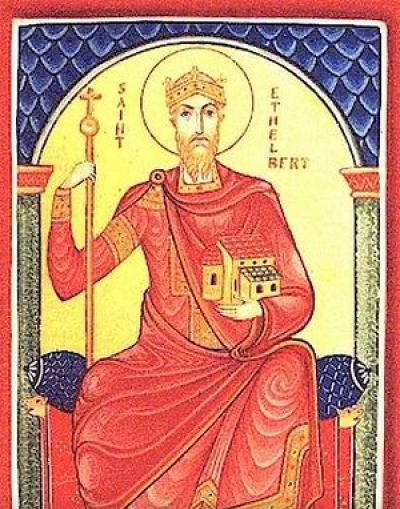
Saint of the Day for 24 February: St. Ethelbert
St. Ethelbert: Christian King and Patron of Ancient England – Life and Legacy
Name
St. Ethelbert
Title
King of Kent
Birth
552 ca., Unknown
Death
Feb. 24, 618, Canterbury, England
Recurrence
24 February
Martyrology
2004 edition
Prayer
We beseech Thee, O Lord, graciously grant us Thy help, and through the intercession of St. Ethelbert King of Kent, stretch Thy protection over us against the manifold snares of the enemy. Amen
Roman Martyrology
In Canterbury, England, St. Ethelbert, king of Kent, whom Bishop St. Augustine converted, first among English princes, to the faith of Christ.
The Saint and Mission
Saint Ethelbert, king of Kent in the 6th century, represents a key figure in the history of the Christianisation of England. His conversion to Christianity and subsequent role in spreading the faith among his people marks a pivotal moment in the intersection of temporal power and spiritual mission. The life of Saint Ethelbert offers us an illuminating perspective on the ability of faith to transform not only individuals but entire societies. St. Ethelbert’s mission can be seen in several lights, but they all reflect the central theme of transformation through faith. Initially, through his marriage to Berta, a Frankish Christian princess, Ethelbert comes into contact with Christianity, thus demonstrating how personal and family ties can become unexpected channels for faith. His openness to new ideas and his willingness to explore his wife’s faith are the first steps towards a broader acceptance of Christianity. His conversion, influenced by the arrival of Saint Augustine of Canterbury sent by Pope Gregory the Great, marks a turning point not only in his personal life but also in the religious history of England. Etelberto embraces the Christian faith not as a political whim, but with a sincerity that leads him to become a fervent promoter of Christianity. His mission, therefore, evolves from a personal journey of faith to a commitment to the conversion of his kingdom. As king, Ethelbert’s position gives him a unique platform to facilitate the spread of Christianity. His authority and his personal example of conversion and devotion have a profound impact on his people, demonstrating that power and influence can be used for spiritually constructive ends. His decision to build churches and provide material support to St. Augustine’s mission reflects an understanding of his kingly responsibility not only to the temporal prosperity of his people, but also to their spiritual well-being. However, St. Ethelbert’s mission is not characterized by coercion or force. Although he had the power to impose the new faith, he instead chooses the path of example and support, respecting the freedom of conscience of his subjects. This approach reflects a deep respect for individual dignity and the personal nature of faith, principles that are fundamental to the Christian mission. Saint Ethelbert teaches us that the mission of spreading the Gospel is intrinsically linked to personal transformation and the ability to use one’s position to positively influence society, promoting peace, justice and faith. His life is a reminder of the power of faith to change the world, not through force, but through love, example, and generous support of the cause of the Gospel.
The Saint and Mercy
Saint Ethelbert, king of Kent and central figure in the Christianization of England, deeply embodies the concept of mercy through his example of leadership and his spiritual transformation. His story is a testimony to how mercy, understood as compassion, forgiveness and love, can be experienced not only on a personal level but also in the leadership of a people. The most evident aspect of mercy in the life of Saint Ethelbert is manifested in his welcome of Saint Augustine of Canterbury and the Christian missionaries. This gesture not only reflected religious tolerance, but a profound mercy that opens the door to the possibility of spiritual conversion and renewal, not only for himself but for the entire kingdom. His decision to listen to and subsequently embrace Christianity shows a disposition towards forgiveness and love, fundamental values of divine mercy. Furthermore, Ethelbert’s approach to spreading Christianity in his kingdom is emblematic of his understanding of mercy as a transformative force. Instead of imposing the new faith through coercion or royal power, he chooses peaceful and persuasive methods, respecting the individual freedom of his subjects. This method of evangelization, based on mercy and respect, allowed for a genuine and lasting conversion, rooting Christianity in the British Isles in an organic and profound way. St. Ethelbert’s leadership also reflects mercy in his desire to promote well-being and justice for his people. His conversion to Christianity and his support for the building of churches and the founding of religious communities were actions imbued with a vision for a society that lives according to the principles of the Gospel, where mercy, justice and peace are dominant values. Finally, the mercy in St. Ethelbert’s life can be seen in his lasting legacy. His testimony of faith, his commitment to peace and justice, and his example of merciful leadership continue to inspire not only Christians but all who seek to live lives guided by compassion and love for others. Saint Ethelbert reminds us that mercy is a powerful force for change, capable of transforming hearts and societies. His life invites us to reflect on how we can exercise mercy in our relationships, in our communities and in the world, following the example of Christ and his holy servants like Ethelbert, whose earthly reign was marked by a profound imprint of divine mercy.
Hagiography
The pagan Ethelbert married Bertha, princess of the Franks, allowing her to profess her religion and, first of the Anglo-Saxon rulers, was converted by Augustine of Centerbury sent by Pope Gregory the Great. The Venerable Bede tells of a meeting that took place on the island Tanatos, in the open because the king feared spells and…
